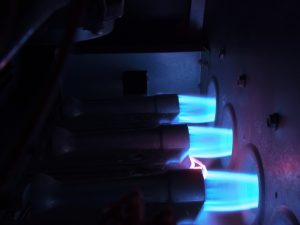 The chill of winter gives you an excuse to curl up in bed with a blanket for a little longer, but that doesn’t mean it’s the best way to keep warm. Of course, your home’s central heating system is the most effective way to cool off, assuming you have one that’s the right fit. Sizing, efficiency rating, style of heater, and more have an effect on whether you feel warm enough throughout the winter (and not just on lazy mornings spent in bed).
The chill of winter gives you an excuse to curl up in bed with a blanket for a little longer, but that doesn’t mean it’s the best way to keep warm. Of course, your home’s central heating system is the most effective way to cool off, assuming you have one that’s the right fit. Sizing, efficiency rating, style of heater, and more have an effect on whether you feel warm enough throughout the winter (and not just on lazy mornings spent in bed).
Let our heating experts help you locate the best heating installation for your home—before temperatures drop any more. Give yourself time to consider your options, if you can. Contact our team, and check out the guide below for a primer on the best heating installations for any home.
Types of Heaters
First, you’ll want to look at the types of heating systems available for your property. In many cases, it’s best to replace a heater with the same type (i.e. replacing a boiler with a boiler, replacing a central furnace with a furnace), but there are some exceptions. Get to know the types of heating systems available in your area.
- Boilers – A costly installation, at first, but boilers heat water and move it throughout the home for radiant heating, a more comfortable and efficient method than heating the air.
- Furnaces – A furnace is the standard system used in home, and for good reason. It’s cost-effective (as long as you have ducts) and can be energy-efficient.
- Heat Pumps – Heat pumps also use the ductwork, and they combine heating and cooling in one. They are highly efficient—until temperatures outside approach freezing.
- Dual Fuel Systems – Also requiring the ductwork, a dual-fuel system combines the efficiency of an electric heat pump with the efficiency and performance of a furnace, to automatically switch over as needed for the lowest energy prices.
- Geothermal Systems – A geothermal heat pump uses energy from the earth to provide some of the most efficient heating and cooling there is.
- Ductless Units – A ductless heat pump is great for small homes and those without air ducts, or new room renovations.
Efficiency Ratings
The next thing that’s important to know is how highly your heater is rated in terms of efficiency. Many people think that the size of the heater impacts its efficiency, but it turns out that bigger systems are not usually the better choice—unless they are properly sized for your home. There is only one size of heater that is the right fit for your space, and a technician can do these calculations, but there are several efficiency ratings to choose from.
Typically, when it comes to heating, you’re looking at the AFUE (Annual Fuel Utilization Efficiency). However, heat pumps, geothermal systems, and ductless units may give you the HSPF, SEER, and EER.
The AFUE rating is actually a percentage, showing you how much of the energy used by your heating system actually gets used for heat (and not lost to the air around it, or other processes). An AFUE of 100 would be ideal, but this is only available on electric heaters (which cost a lot to run due to the high cost of electricity. In the best-case scenario, look for an AFUE of about 90 or higher.
Our best advice is to call the right HVAC technicians to help you. For HVAC in Fairfield, OH, contact Bartels Heating & Cooling.
